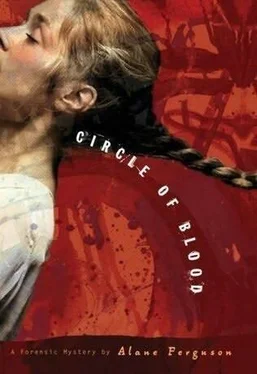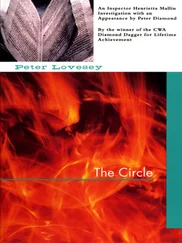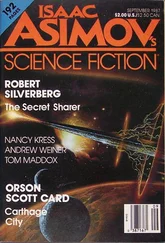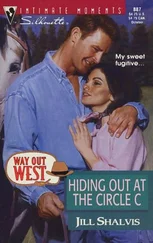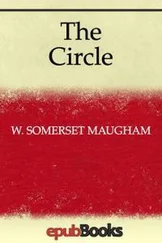“I want to keep this ring,” she said finally. As she stood and looked down on her mother’s bent head, at the wavy hair, she reached out to touch it. “I’ve got to keep the ring,” Cameryn said again, louder this time.
Her mother’s tear-streaked face looked up at her. “I don’t care. I don’t want it.”
“Okay,” Cameryn said, thinking hard. “For now, they think Mariah most likely committed suicide. If that’s true then there is no reason for you to get dragged into this. As long as it stays that way, I think it’s best to keep everything quiet.”
"So you won’t tell?”
“Not yet.” It was all she could promise, because it was as far as she could think through. “The wallet wasn’t in the backpack. It might show up somewhere again. Did you report it stolen?”
Swallowing, her mother looked at her with wide eyes. There were flecks in Hannah’s eyes that matched Cameryn’s, little bits of gold, proof of the DNA that knit them together.
“No,” Hannah whispered. “I haven’t told anyone. After you called, I went straight home. I promise.”
Cameryn nodded. “In case they find it in a Dumpster somewhere, you have to say you had your purse in your car and you left your car unlocked. Someone stole your wallet and you just didn’t want to go through the hassle of reporting it. I don’t think it’s going to turn up, but in case it does, we have to be ready. We both need the same story. Do you understand what I’m saying?”
“I understand.” The knees, which had tented the sheet, disappeared back into the bed. Hannah gave a small smile, a child’s trusting smile. “You’re trying to help me.” It was a statement, not a question.
“Of course I’ll help you,” Cameryn answered. “You’re my mother.”
Hannah began to laugh, but then her face changed again as she tried to hold back a sob. With shoulders quaking, she patted the bed even harder. “I’m so sorry. I’m sorry I brought you into this mess.”
Cameryn perched on the edge of the bed as a tear rolled down Hannah’s cheek to fall quietly onto a quilted rose.
“I have to go now,” Cameryn said. She felt helpless, utterly helpless. She wanted to get up and run but instead she made herself be calm. If it’s ruled a murder, I’ll deal with it then, she told herself. Aloud, she said, “Tomorrow I’ve got to go back to Durango to finish the autopsy. There are some things I need to check out now.”
Hannah paused. Once again the expression shifted. She began to pick at a loose thread, pulling a loop free. “They think it’s a suicide, right?”
“Dr. Moore hasn’t figured out a manner of death yet. Tomorrow he will.”
“It’s so sad, the way she cut off her pretty hair.” As Hannah pressed her fingertips into her forehead, Cameryn tried to quell the sick feeling roiling in her stomach.
“Mom-how did you know about the hair?”
“What?” Hannah’s face looked flat and empty, far away, as if her soul hung miles above the mountain clouds. “Oh, the cook from High Noon Burgers, Barry something-he’s Mrs. Kennedy’s son. She told me this morning. I guess it’s hard to keep a secret in a small town.”
“You’re right. Secrets never stay buried in Silverton,” Cameryn repeated. She decided to believe this. For now, she would trust her mother and everything Hannah said. Standing, Cameryn reached down and awkwardly kissed the top of her mother’s head. “Get some rest.”
“It’s hard to keep secrets,” Hannah said, in a voice barely above a whisper. Her forehead wrinkled and her face became soft in appeal. “But, Cammie, if you love me… then you have to keep mine.”
“WELL, WELL, WELL, Miss Mahoney, you’re back,” said Dr. Moore. “And you brought your morgue shoes. Your camera, too, I hope.”
“Yes,” she said. She looked at the floor and was immediately glad she’d remembered to wear her old running shoes to the autopsy suite. The linoleum was riddled with droplets of blood, which created a strange effect; it looked to Cameryn like a red galaxy had erupted on the floor. Dr. Moore’s eyes followed hers as she took in the floor. “You missed a messy autopsy this morning,” he said. “Ben will be here soon to mop it up.”
During her lunch hour Justin had called to tell her he and the sheriff were meeting with some men from the Colorado Bureau of Investigation, an announcement that sent a wave of fear through her. But when Justin added, “Jacobs called in the CBI to help identify Baby Doe-I guess they have some sort of strategy,” Cameryn had felt herself relax. The CBI men weren’t asking about Hannah.
“As you can probably tell, it’s already been a long day,” said Dr. Moore. Although it was only three thirty in the afternoon, the strain of the day showed on his face-it was pink, shiny with sweat. The sockets of his eyes had darkened while the veins in his temples visibly throbbed. But it was Dr. Moore’s plastic apron that revealed what kind of work he’d been subjected to before her arrival. The apron was streaked with blood, some in vertical stripes, but most lined in horizontal rows that stretched across his chest and belly, each line dotted with splatters the size of quarters. It looked like a musical score, sprinkled with notes from a song. The music of death.
“Is there a problem, Miss Mahoney?”
“I’m sorry. It’s just-there’s so much blood.”
“A drunk ran a red light and hit a pedestrian head-on a few blocks from here. The drunk, of course, is fine and recovering in Mercy Medical. The decedent is already in the cooler.”
“That’s so awful,” she breathed.
“The inequities of death. You have to harden yourself or you’ll never get through.” He looked at her wearily. “You can put your backpack on the desk along with your coat. Suit up so we can get started, although I don’t think you’ll need more than a paper apron and gloves. You’ll be more of an observer today.”
Cameryn dropped her belongings, then walked to the locker and put on a disposable apron. Silently stripping away his bloody apron, Dr. Moore opened a cabinet and threw the garment into a biohazard container marked for washing. The gloves were tossed into the garbage can. He pulled out fresh gloves and a new, folded plastic apron, which he looped over his head before knotting the waist ties behind his back.
“Did you see the sketch of Baby Doe in the paper this morning?” he asked. “The artist did a fine job. He worked off a photograph you took. It was a very good likeness.”
“I didn’t get a chance to see it yet, Dr. Moore.” Suddenly alarmed, she said, “I smell something. Is there a fire?” An acrid odor, like smoke from a campfire, had wafted its way through the autopsy room.
“No, Ben’s just cleaning up. It’s burn day.” Dr. Moore adjusted the loop around his neck so that the apron fit snugly.
“Burn day?”
“Ben’s throwing tissue into the incinerator. We do it once every three months. He’ll be done soon.”
“You’ve got a crematorium here?”
“No. We have an incinerator.” He turned to her then, examining her, the lenses of his glasses magnifying his eyes. She could see how bloodshot his eyes were. “At some point we have to dispose of all the parts left in the buckets-heart, brain, lung, liver. After eighteen months, they’re gone. Unless it’s a homicide. Those parts we keep forever.”
“There’s a lot of smoke. How much are you burning today? ”
“We’re losing about”-he thought for a minute, staring at the ceiling-“one hundred and twenty pounds of tissue. It’s quite a job. There are regulations on how much we can incinerate at once. Air-quality issues and such.”
“Oh.”
“Oh, indeed.”
Читать дальше
